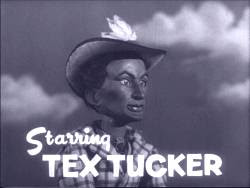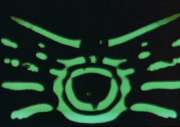episodes 7-13
A Close Shave
Once again, they do the joke of Twink being interrupted whilst trying to tell this week’s story, but with a further twist. Initially, Twink is saying goodbye to Jake who’s going off for a ride with Tex – only then does he notice and acknowledge the viewer. Though he has to admit at the end that he couldn’t think of a story this week anyway, so Pedro’s arrival means there was something for the viewer to watch after all! This week, Pedro is conspiring with an Indian called Red Scalp. The plan is simple: Red Scalp will ride into town and tell Tex that the Indian camp at Yellow Gulch has been attacked by bandits – then when Tex goes to investigate, Pedro will enter town the back way and rob the bank. (So, this must mean the rockfall at Yellow Gulch has been cleared away, leaving two routes into town once more. See, I worry about these details – no one mentions it in the episode however.) Although I was a little disappointed to see an Indian turn up as a villain, Red Scalp does appear to be a lone figure, implying at least that he’s some sort of renegade. It’s also clear that his alliance with Pedro is pretty uneasy, with plenty of mutual distrust. Indeed, Red Scalp is not keen to take on Tex due to his magic guns, but Pedro assures him they won’t work on Indians, being Indian magic themselves. What Pedro hasn’t reckoned on is Dusty the Dog overhearing the plan and tipping Tex off, so the whole plan falls flat. When Red Scalp finds that the magic guns will work on him after all, he takes his revenge on Pedro by scalping him. Tex tells Pedro he can’t intervene because his guns won’t work on Indians! Poetic justice – though it is slightly uncomfortable to think that Tex would allow a scalping to take place in the main street. Just as well he realizes that Red Scalp is only going to teach Pedro a lesson by shaving his hair and moustache off, not actually scalping him! (Though I’m not sure how Tex knows this. I’m also not quite sure what to make of Red Scalp yet – his name and some of his actions mark him out as a pretty vicious character, but that conclusion paints him as more of a comedy villain like Pedro.)
Pedro’s Pardon
Tex is putting up a new wanted poster for Pedro, using his gun to fire the nails into the wall while Jake holds the poster up for him. I’m not even sure that’s technically possible – and the health and safety implications are horrendous! Anyway, Pedro turns up and says he’s turned over a new leaf and wants to live as a citizen of Four Feather Falls. Tex responds by locking him in jail, and proceeding to sing a new song to him. As a cruel and unusual punishment, that’s like something out of Guantanamo Bay. But eventually Tex decides to give Pedro a chance to prove he means what he says. It doesn’t take Pedro long to show his true colours, short-changing Ma Jones when he buys a new hat; and then Red Scalp turns up to complain that Pedro has been caught stealing Indian horses – the real reason he’s sought sanctuary in the town. Red Scalp also knows that Pedro keeps his money in his hat, and shoots an arrow through it, spilling money everywhere. Tex allows him to take the price of the horses, which seems consistent with his actions last week of allowing the villains to sort out their own differences as long as it doesn't affect the rest of the townsfolk.
The Toughest Guy in the West
Tex must be really pleased with his song from last week, because here he’s singing it again for the other townsfolk. This leads into some mickey-taking of Grandpa Twink when he says he used to be known for his singing voice – it also seems that he was a gunslinger once who single-handedly fought off a tribe of Comanches, but no one will believe his stories. Twink and Ma Jones set off for Silver City, only to be set upon by Comanches. They take refuge in a barn, where they discover Indian Jack hiding. He’s a white man who dresses like an Indian, and supplies guns to the Comanches. He’s obviously double crossed them though, because it’s him they’re really hunting. Indian Jack is a really nasty piece of work, a real contrast to the camp comedy villains we’ve met so far. He’s quite clearly going to shoot Twink and Martha to make his getaway. Luckily, Twink manages to get the better of him in a moment of confusion. By the time Tex turns up to help, the Comanches are on the run, thanks to the intervention of Chief Kalamakooya and his braves. (This at least restored a bit of my faith in the show – although the Comanches were acting as standard Indian bad guys, Kalamakooya’s desire to live in peace with the white men is still refreshing – it also demonstrates that there are different Indian nations with their own customs and agendas, not just a generic mass.) Tex can’t quite believe that Twink has managed to hold off the Indians and capture Jack – so perhaps his old reputation was deserved after all.
Gun Runners
Again, Kalamakooya appears to Tex, and warns him that someone is supplying guns to the Indians. He’s worried that some of the young braves may turn on the white settlers if they get their hands on guns, which suggests that Kalamakooya’s control of his tribe might be a little uncertain and precarious. Anyway, the guns are being supplied by Big Ben, and his potential buyer is Red Scalp, who therefore appears to be veering back to being a villain again. They plan a meeting to exchange gold for guns, but in what’s becoming a bit of a trope for the series, it’s overheard by Dusty who tips Tex off, and he’s able to catch them in the act. Kalamakooya appears, and says Red Scalp will face the justice of his people, and the two Indians just fade away. Even more mystical, the bag of gold fades away too before Ben can get his hands on it. Indian gold isn’t for the white man, it seems.
Jail Break
An episode that’s mostly about Pedro and Fernando. Pedro is annoyed to find his wanted poster has been replaced by one for Zack Morrill, who’s got an even bigger reward on his head. He wants to be the most wanted man in Four Feather Falls, so he decides to capture Morrill himself and hand him in for the reward. (There’s also the fact that he once worked with Morrill and thinks he never got his cut of the loot.) Unfortunately, the scheme is blown open by Fernando, who meets Morrill on the road, and despite having seen his wanted poster, fails to recognize him and proceeds to tell him what Pedro’s up to. But despite being thus prepared, Zack falls foul of some comedy violence and ends up being captured anyway. He tells Pedro about the loot he’s got stashed away which he’ll share with him. So Pedro decides to hedge his bets. He hands Morrill in for the reward, then plans to break him out of jail so they can share the loot. Needless to say, the jail break goes hilariously wrong, and Pedro and Fernando end up as caught as Morrill. The closing moment sees Pedro’s face superimposed on his wanted poster, pleading with Tex to be left up as the most wanted man in his home town. It’s a sort of self-aware, almost post-modern technique – demonstrating a show that’s aware of its own fictionality – that makes this series seem sophisticated and ahead of its time, and again gives it an appeal to the adult viewer.
Trapped
And here again, the show demonstrates that it’s not only broken the fourth wall, but demolished it. They’ve developed from using Twink as a simple storyteller, to having him address the viewer in the midst of the action – but here, it’s Jake who talks to the audience, saying how he’s sneaking out while his grandpa’s asleep, as he’s promised to go fishing with Makooya. (Now, wait a minute here. Makooya was a boy when Tex found him in the wilderness, and that was before the founding of Four Feather Falls, so presumably a good few years ago. Yet here he is again, and he doesn’t look any older. Does the Indian magic extend to freezing the ageing process – or time travel?) Well, Makooya seems to have acquired some of his grandfather’s magic, such as the ability to teleport himself, though he says he’s not yet very good at it. Jake and Makooya explore some caves, where they discover Big Ben and Red Scalp making counterfeit coins. Red Scalp seals them in the caves - and lo and behold, Makooya's magic isn't enough to get him out again. Nevertheless, Tex finds them after arresting Red Scalp for passing the counterfeit coins – but not before Big Ben has taken the boys hostage. Jake thinks he'll be in trouble with his grandpa, but an appearance by Kalamakooya to sing the boy's praises seems to put paid to that.
Dusty Becomes Deputy
OK, so Tex finally takes leave of his senses and appoints his dog as his deputy. I know he can speak, Tex, but only to you. To anyone else, this is going to look like a Caligula-style excess. Still, at least he doesn't leave Dusty any guns to use! This week, there's a prairie fire on the edge of town - Tex has to rush off to deal with it, before it spreads to Four Feather Falls itself. The twist is the fire has been caused by Pedro and Fernando setting fire to their shack – another of their schemes to get Tex out of town, so they can rob the bank in his absence. You'd think he'd have worked it out by now. When Dusty spots the bandits, he does his usual trick of hiding nearby and overhearing their plans. Then he rushes to find Tex and bring him back - but disaster! Tex has accidentally dropped the feather that enables Dusty's voice. They have to go back and look for it. But any drama is undercut as they find it quite easily, and Tex is able to rush back to town and stop the bandits. Having seen a few episodes now, I've realized another running gag is that most Pedro episodes end with his hat being shot off – he's really rather inordinately fond of his hats, so this seems to be the worst thing you can do to him. Here, Tex manages to shoot the crown clean off, but otherwise leaves the hat on his head – and Pedro, not realizing the damage, thanks him for sparing his hat for once!




